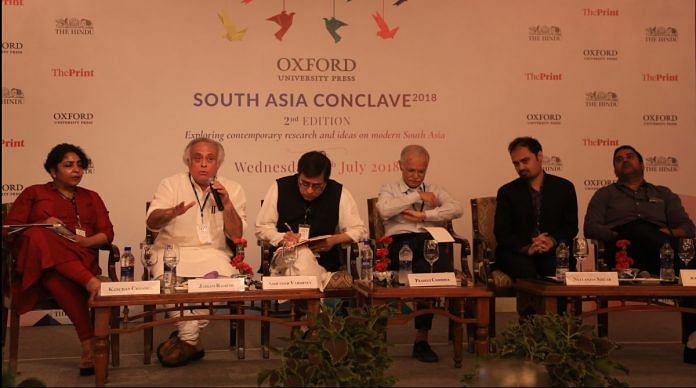The first session at South Asia Conclave 2018 saw panelists discuss the upcoming book, Ideology and Identity: The Changing Party Systems of India.
New Delhi: Ideology has taken centrestage in political discourse as India passes through a time of deep political polarisation, and it was a discussion on this emergence of ideology-based politics that kicked off the second edition of the South Asia Conclave Wednesday.
An initiative of the Oxford University Press, the conclave seeks to offer a platform where issues pertaining to south Asia, home to a quarter of the world’s population, are discussed.
The first session at South Asia Conclave 2018 saw panelists discuss the upcoming book, Ideology and Identity: The Changing Party Systems of India, which has been written by Pradeep Chhibber, director of the Institute of International Studies at the University of California Berkeley, where co-author Rahul Verma is a PhD candidate in the department of political science.
Professor Ashutosh Varshney of Brown University moderated the session, with the panel comprising Rajya Sabha member Jairam Ramesh, New York University (NYU) professor Kanchan Chandra, and Neelanjan Sircar, a senior fellow at the Centre for Policy Research, along with the authors of the book.
The book seeks to challenge “the view that party politics in India is basically about patronage, and claims that ideas and ideologies actually play a central role”, but not in the same way as they do in the West.
It argues that statism, the extent of state intervention in society and social norms, and recognition, how the state should protect the rights of minorities from assertive majoritarian tendencies, form the two pillars of debate around ideology.
“Political parties’ fortunes in India depend on how they manoeuvre within the ideological space in Indian politics,” said Verma.
Along with Chhibber, he said ideological messages had an impact on Indian voters, adding that a widening divide had led to deeper polarisation in India.
While Ramesh said the book did try to bring rationality into the largely sentimental domain of Indian politics, he added that the conclusions made were a far cry from the “everyday reality of Indian polity”.
The binary of ‘statism and recognition’, he said, cannot do justice to the “complexities and diversities that exist within the political parties in India”.
“Their conclusions, based on data, fail in the face of everyday reality,” he added, “The real role of why the sentiment on ideology and recognition has got more salience after 2009 is missing from the book.”
“It is unbelievable to argue that the BJP (Bharatiya Janata Party) won 2014 on the plank of less statism (than the Congress’),” Ramesh said. “The claim that the Congress’ inability to understand and accommodate the power shift from metropolitan elites to small town elites has led to its fall… but BJP, regional parties have, doesn’t fly realistically,” he added.
Kanchan Chandra of NYU agreed, saying that “looking at the BJP’s actions, we can’t say it is a less statist party than the Congress”. “The central point is ideology matters in Indian politics,” she added.
Ramesh pointed out that all political parties had “multiple ideologies to cater to multiple constituencies”, therefore, “the idea of a homogenous ideology flies in the face of political experience”.
The discussion ended with a consensus that ideology did matter in Indian politics, but defining it in fixed binaries did not complement the Indian situation.



